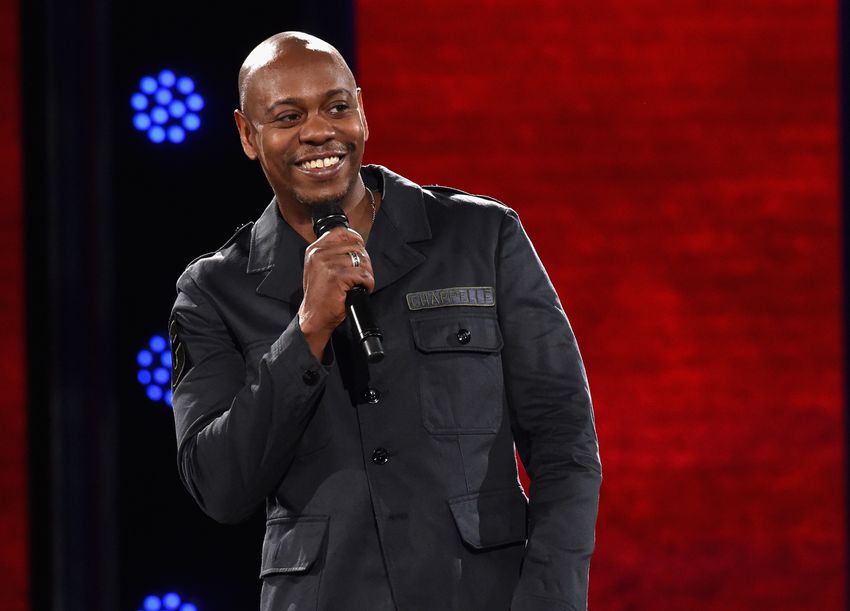Previously, we argued why Dave Chappelle is one of the greatest comedians. An artist who has paved the way for Black communities with his politically charged jokes that serve as a searing commentary on racism, police brutality, cancel culture, sexual abuse and more. His previous stand-up specials have been unique, interesting and thought-provoking. Kevin Hart even applauded him for having the unapologetic guts to talk about taboo and/or controversial topics and manage to blend in self-aware comments that serve as an essential social critique.
However, his recent stand-up comedy special, titled The Closer, released on Netflix in October of this year, landed him in some hot water with the rest of the world.
While fans were excited for the special, the experience turned into a sour one that seemingly divided the global audience into those against and those in favour of Chappelle’s polarising comments. Chappelle, who previously made a statement in 2017 stating how he, “as a policy” never regrets whatever he says onstage, went on to make pretty scathing remarks that infuriated the trans community. The jokes even caused a major employee walkout in the Netflix headquarters after the streaming giant fired a prominent trans employee who spoke out against Chappelle’s distasteful remarks.
The Closer was supposed to be a curtain call for Chappelle’s time on Netflix and the comedian was supposed to move on to a different project. Although the premise seemed promising, Chappelle spoke of the rapper DaBaby at the very beginning of his show to bring about the contorted American sensibility in the context of LGBTQ+ rights and racial relationships. What he said completely contradicted the several movements to date when he pitted the Black community against the LGBTQ+ community, infuriating the trans community with his under-researched comments.
In his rant about gender, Chappelle began by saying how his problem had always been white people before going on to call gender a “fact” and trying to differentiate between “women” and “trans women” on the basis of their ability to bear children and menstruate, even going on to say, “It tastes like pussy, but that’s not quite what it is, is it? That’s not blood. That’s beet juice.” His ignorance and nonchalance clearly present, Chappelle did not stop there.
As part of his act, the comedian went on to talk about hitting a lesbian woman on her breasts, a confrontation with a trans man and even tried to prove his ‘wokeness’ by recalling a time when he allowed a trans woman with little to no experience to open for his San Fransisco show. He also defended the openly transphobic Harry Potter author J.K. Rowling which angered many people.
Following the backlash, Chappelle released a video in which he said: “To the transgender community, I’m more than willing to give you an audience. But you will not summon me.” The comedian went on to note: “I said what I said and boy, I heard what you said. My God, how could I not? You said you want a safe working environment at Netflix, it seems like I’m the only one who can’t go to the office.”
While fans and other viewers were indeed shocked by his comments, which are in line with his buddy Hart’s homophobic remarks that date back a few years, his entire show is endemic of a greater problem.
There was an immense outburst against his show with the GLAAD and National Black Justice Coalition appealing to Netflix to take down the title. They were concerned about the kind of attacks that were meted out to transgender people, in particular, those from the Black community. Their argument, “perpetuating transphobia perpetuates violence” is indeed important in the age of the rapid advancement of media and communication, as it leads to something called the ‘ripple effect’.
The ‘ripple effect theory’ refers to a cause that spreads gradually as a result or consequences of a certain initiative. In this case, as soon as cis-gendered people, who already bear certain prejudices or stigma against the trans community, come in contact with Chappelle’s comments, they have the means to justify themselves.
Taking a closer look at Chappelle’s The Closer proves how the comedian otherised the trans community at large. His lack of awareness of the volatility of the situation can lead to an increase in anti-trans sentiments. His comments were made in bad faith and it seems like the comedian did not know what he was talking about. While it is important to encourage freedom of expression and free will, one must be mindful of refraining from making statements that might seriously injure a certain individual or a community.
Given the stature of Chappelle’s fame, one might expect better from him. His stubbornness and refusal to try and educate himself regarding gender and sexuality reflected in his sorry jokes that lacked the respect and intellectualism expected of him.
